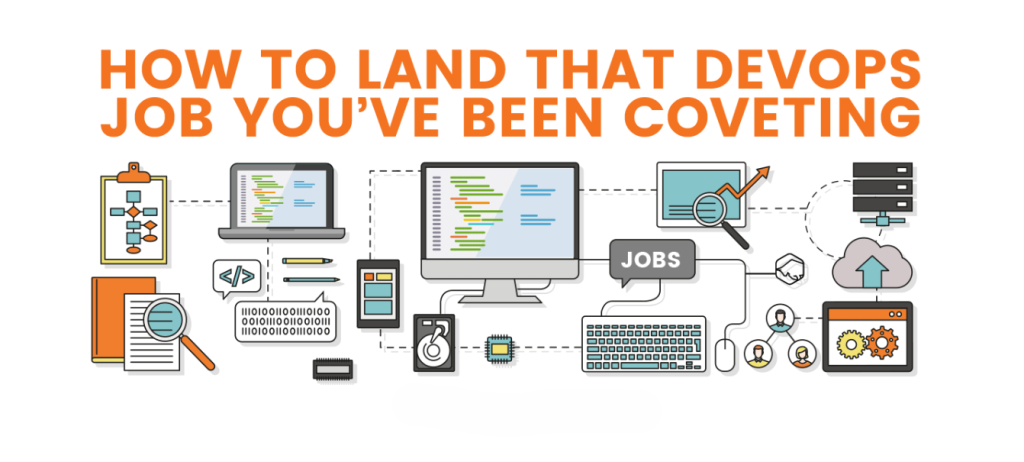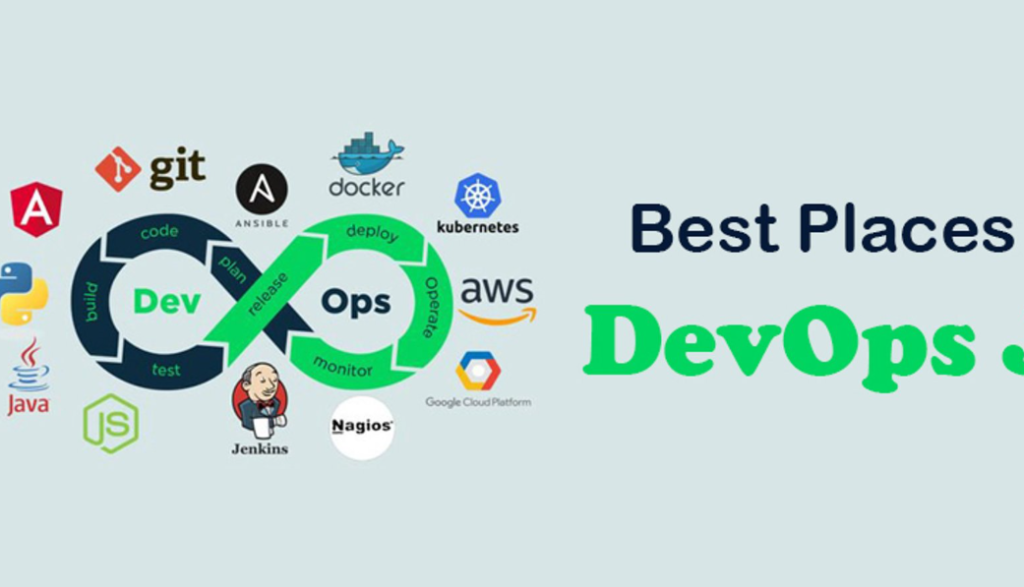Upgrade & Secure Your Future with DevOps, SRE, DevSecOps, MLOps!
We spend hours on Instagram and YouTube and waste money on coffee and fast food, but won’t spend 30 minutes a day learning skills to boost our careers.
Master in DevOps, SRE, DevSecOps & MLOps!
Learn from Guru Rajesh Kumar and double your salary in just one year.

DevOps has become one of the most sought-after skills in the technology industry due to its ability to improve collaboration between development and operations teams. Organizations are increasingly adopting DevOps practices to streamline their development processes, improve system reliability, and speed up delivery. As a result, the demand for skilled DevOps professionals has skyrocketed across various industries.
Finding a DevOps job requires a combination of the right skills, experience, and strategies. In this post, we will explore how you can find DevOps jobs, highlighting the major features of the job search process, including skill-building, networking, and using job boards effectively.
Building the Right Skills for DevOps Jobs
Before diving into the job search, it’s essential to ensure you have the necessary skills and knowledge to be competitive in the DevOps job market. DevOps roles require a combination of development, operations, automation, and cloud expertise.
Key Skills for DevOps Jobs:
- Programming and Scripting Languages: DevOps professionals often need to know programming languages such as Python, Go, or Ruby for automation tasks. Scripting languages like Bash and PowerShell are also crucial for system administration and automation.
- Version Control Systems: Proficiency with tools like Git is essential for managing code, collaborating with teams, and maintaining a history of changes in DevOps workflows.
- Continuous Integration and Continuous Delivery (CI/CD): Understanding CI/CD pipelines and tools like Jenkins, GitLab, and CircleCI is critical to automate testing and deployment processes.
- Containerization and Orchestration: Knowledge of Docker and Kubernetes is highly valued, as they allow for better deployment, scaling, and management of applications across environments.
- Cloud Platforms: Familiarity with cloud platforms such as AWS, Azure, or Google Cloud is essential as DevOps is increasingly cloud-centric.
- Monitoring and Logging Tools: Understanding monitoring tools like Prometheus, Grafana, Splunk, and ELK stack is important to track system health and ensure continuous delivery.

Where to Search for DevOps Jobs
Once you’ve honed your skills, the next step is knowing where to look for DevOps job opportunities. There are various platforms and job boards dedicated to tech roles, including DevOps positions, where you can search for the right job fit.
Job Platforms for DevOps Jobs:
- Job Boards and Websites: Websites like LinkedIn, Indeed, Glassdoor, and Monster feature a large number of DevOps-related job postings. Make sure to use specific filters for “DevOps Engineer,” “Site Reliability Engineer (SRE),” or similar terms to refine your search.
- Specialized Tech Job Boards: Websites such as Stack Overflow Jobs, AngelList, and GitHub Jobs cater specifically to tech roles. These platforms offer curated listings for developers, DevOps engineers, and other technical professionals.
- Freelance Platforms: If you’re interested in freelancing or remote DevOps opportunities, consider platforms like Upwork, Freelancer, and Toptal. Many companies are now hiring DevOps professionals on a contract or remote basis.
- Company Career Pages: If there are companies you’re particularly interested in working for, visiting their career page is a great way to find job openings. Many companies prefer candidates who apply directly through their websites.
- Recruiters and Staffing Agencies: Specialized tech recruiters can help you find job opportunities that match your skills. They often have insider knowledge about unlisted opportunities and can guide you through the hiring process.
Networking and Building Connections
Networking plays a key role in finding DevOps jobs, as many opportunities are not posted on public job boards but are instead filled through referrals or industry connections.
Networking Strategies for DevOps Jobs:
- Attend Meetups and Conferences: Look for DevOps-related events, meetups, and conferences in your area or virtually. These events allow you to meet industry professionals, learn about new tools and technologies, and potentially hear about job openings.
- Join DevOps Communities: Participate in online communities like Reddit’s DevOps subreddit, DevOps.com, or Stack Overflow. By engaging in these forums, you can learn from others, share your expertise, and build valuable connections.
- Leverage LinkedIn: LinkedIn is one of the most effective platforms for professional networking. Follow DevOps groups, engage in conversations, and connect with other professionals in the field. Ensure your LinkedIn profile highlights your skills, experience, and DevOps knowledge.
- Collaborate on Open Source Projects: Contributing to open-source projects related to DevOps tools (such as Kubernetes or Terraform) can showcase your skills, help you gain hands-on experience, and connect you with like-minded professionals and potential employers.
- Ask for Referrals: Don’t hesitate to ask your network for referrals or introductions to hiring managers. Personal connections can significantly increase your chances of landing an interview.
Tailoring Your Resume and Cover Letter
To stand out in a competitive DevOps job market, you need a resume and cover letter that reflect your skills, experience, and accomplishments. Crafting a tailored application can increase your chances of getting noticed by recruiters and hiring managers.
Tips for Your DevOps Resume and Cover Letter:
- Highlight Key DevOps Skills: Ensure that your resume lists the key DevOps tools, practices, and technologies you have experience with, such as CI/CD pipelines, containerization (Docker/Kubernetes), cloud platforms (AWS/Azure), and automation tools.
- Showcase Relevant Experience: Focus on relevant projects, whether they are from previous jobs, internships, or personal projects. Emphasize how you’ve automated processes, improved system reliability, or optimized cloud infrastructure.
- Quantify Achievements: Whenever possible, use quantifiable metrics to showcase the impact of your work. For example, “Reduced deployment time by 30% through CI/CD pipeline automation” or “Improved system uptime by 15% through proactive monitoring and troubleshooting.”
- Personalize Your Cover Letter: Your cover letter should be personalized for each job you apply to. Express your interest in the company, explain why you’re a good fit for the role, and highlight any connections you may have with the organization.
- Keep It Concise: Hiring managers often have limited time, so make sure your resume is clear, concise, and easy to read. Focus on your most relevant skills and experiences, and avoid unnecessary details.
Preparing for DevOps Interviews
Once you start landing interviews, it’s important to be well-prepared for questions related to your technical knowledge, problem-solving skills, and experience with DevOps practices. The interview process for DevOps roles often involves technical interviews, problem-solving exercises, and discussions about past projects.
DevOps Interview Preparation Tips:
- Study Common DevOps Concepts: Be prepared to discuss key DevOps concepts such as CI/CD, automation, version control, containerization, cloud infrastructure, monitoring, and infrastructure as code (IaC). Review tools like Jenkins, Git, Docker, and Kubernetes.
- Practice Problem-Solving: Many DevOps interviews include live coding challenges or system design exercises. Practice solving problems related to automation, deployment pipelines, and system architecture to prepare for technical interviews.
- Prepare for Behavioral Questions: Employers want to know how you approach teamwork, problem-solving, and conflict resolution. Be ready to discuss past experiences, how you collaborate with different teams, and how you’ve handled challenging situations.
- Demonstrate Knowledge of Best Practices: Show that you are familiar with DevOps best practices such as Agile development, continuous testing, infrastructure as code, and security considerations in DevOps (DevSecOps).
- Ask the Right Questions: In addition to answering questions, ask thoughtful questions about the company’s DevOps practices, team structure, and tools. This shows your interest in the role and can help you determine if it’s the right fit.
Landing Your DevOps Job
Finding a DevOps job requires a combination of technical skills, networking, and strategic job searching. By building the right skills, utilizing various job search platforms, networking effectively, tailoring your application materials, and preparing thoroughly for interviews, you can significantly increase your chances of landing a DevOps role.
The demand for DevOps professionals is only expected to grow, offering numerous opportunities in a wide range of industries. With the right approach, persistence, and preparation, you can find a rewarding DevOps job that matches your skills and career goals.